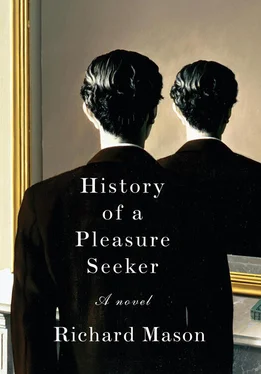“I was répétiteur for my mother and her students from the time I was nine.”
“Excellent. Perhaps you would play for me now?”
“With pleasure.”
Jacobina rose. “Let me take you to the schoolroom. Egbert’s sisters, my daughters Constance and Louisa, have banished him to the house next door. Fortunately it belongs to my aunt, who now spends most of the year at Baden-Baden. We have had a door specially constructed so that Egbert needn’t use the street. I suppose it was the wrong thing to do, but he can be — obsessive, at times, about his playing, and Louisa in particular has a sensitive ear. In my aunt’s drawing room he can make as much noise as he likes without disturbing anyone.” She led Piet into the dining room and he saw that on one side of the fireplace the shape of a door was cleverly hidden in the wallpaper. Jacobina opened it to reveal an entrance hall tiled in white and black and rather smaller than the one at Herengracht 605.
He held it for her as she passed through.
Jacobina Vermeulen-Sickerts had taken many men to her aunt’s house to hear them play the heavy Bösendorfer that was Egbert’s closest confidant. She had taken them alone and never felt at all awkward; but when the secret door clicked behind the handsome Piet Barol she felt suddenly that she was doing something improper. She crossed the hall and opened the drawing room door. “Egbert’s in bed today. He catches colds easily — that’s why we keep it so hot in here.” It was, indeed, very hot. Heavy gilt radiators burbled beneath windows hung in midnight-blue velvet. “Do remove your jacket if you’re too warm.”
Piet did so and sat at the piano, wondering what he should play. He was no virtuoso, and the possibility that an oily-nosed overachiever would snatch this chance from him made his stomach clench. He opened the instrument, waiting for inspiration, and the memory that came to him was of his mother telling him that the only key for love is E flat major. He glanced at Jacobina. She did not look like a woman whose sensual appetites were well catered for, and the room was certainly the temperature for tenderness.
What would she permit?
The idea of finding out reignited old temptations, for this was not the first flirtation Piet Barol had conducted from a piano stool. He hesitated, weighing the dangers. But already the adrenaline of risk was pumping through him and would not be disobeyed.
Mrs. Vermeulen-Sickerts wanted a tutor with authority and gentleness. He should play her something slow and sentimental and not too difficult, preferably in E-flat major. But what? Jacobina moved past the piano and turned to face him, just as his mother’s students had done. As she passed he caught her scent — of rosewater and musk and hand-laundered underwear — and it came to him that the second nocturne of Chopin fulfilled all his criteria.
Nina Barol’s edition marked this piece espressivo dolce —to be played sweetly and expressively — and Piet began to play it softly from memory, at a slow andante . The piano was first rate and recently tuned, and it lent his performance a finesse he did not often achieve on his mother’s upright.
He was correct: it was many years since anyone had touched Mrs. Vermeulen-Sickerts with the aim of giving her pleasure. Jacobina had almost ceased to mourn this sad fact, but in the presence of such a beautiful young man it struck her forcefully. She stepped closer to see him better. Piet’s face was manly but graceful, with succulent red lips that prompted thoughts of her husband’s dry little kisses.
Jacobina looked away.
Piet tripped in a run of semiquavers, but the piano forgave him and hid all traces of the jarring note in folds of rich harmony. As he played he sensed the atmosphere responding to the music’s enchantments. Indeed Jacobina’s nostalgia for the lost opportunities of her youth increased with every note. Watching Piet, she was not unaware of the muscles of his shoulders nor of the way his perfectly laundered shirt clung to his back as he leaned over the keys. It was a long time since she had heard any music but her son’s relentless exercises, and the gentleness with which Piet’s huge fingers elicited these hushed sounds from the piano was bewitching.
It was a secret she no longer shared with anyone, but Jacobina Vermeulen-Sickerts was very different from the woman her family and closest friends thought they knew. In her deepest self she was more like Louisa than Constance and had spent her girlhood imagining a life not at all like the one she now enjoyed. A change in her breathing made Piet’s pulse quicken. He looked up, caught her watching him, and held her gaze until she looked away. He was used to enlivening the lessons of Nina Barol’s prettiest pupils in this fashion and since his seventeenth birthday had grown steadily bolder — though he had never yet employed his stratagems on a lady of rank, or in a situation so laden with potential disaster.
Piet played the last bars of the nocturne very delicately and the piano’s ringing made the air between them tingle. He did not silence it by lifting his foot from the pedal. When Jacobina said “Play me something more modern, Mr. Barol,” he was ready for her. His choice was the entr’acte to the third act of Carmen , also in E-flat major, which had been useful in similar situations before. Its pure, beguiling melody rose from the embers of the nocturne and the rumbling arpeggios of the bass line showed his hands to advantage. As he played, he thought of the smugglers who appear onstage at its close, whispering that fortune awaits if only they will tread carefully. This was exactly how he felt as he drenched his quarry in sweet, permissive magic.
Jacobina Vermeulen-Sickerts’ social position protected her from the lascivious stares of men. The possibility that she had encountered one now left her flustered, but not disagreeably so. She looked away, deciding that she had been mistaken, but when her eyes flicked again to Piet Barol’s she found that his were ready to meet them, and this was joltingly erotic. Jacobina rode twice a week but otherwise took very little exercise. She had recently begun to worry that this showed and to feel rather let down by her once sylphlike body. To receive an admiring glance from a young man was exhilarating.
She stared out of the window as Piet finished playing.
“What a touch, Mr. Barol.” She spoke the compliment to the street outside and when she turned to face Piet he was smiling at her, and did not stop.
Piet Barol’s smile often got him what he wanted. On this occasion it was full of charming hopefulness, and under its influence Jacobina made a decision. “You are welcome to take your meals with us, or dine out as you wish. You will find us an easy-going family. My daughters delight everyone they meet. And Egbert …” But she left this sentence unfinished. “Mrs. de Leeuw will show you to your room.”
“I will give of my best, mevrouw .”
“I am sure my husband will wish to see you before dinner. I’ll have some shirts and socks of his sent up. We can arrange for your bags to come tomorrow.”
“Thank you, Mrs. Vermeulen-Sickerts.”
“Je vous en prie.”
Naomi de Leeuw did not approve of tutors as a breed, nor of their ill-defined place in the household hierarchy — neither servant nor guest. One or two of Piet’s predecessors had used this blurred distinction to their advantage and she had no intention of allowing this cocky young man to do the same.
“You will share the attic floor and a bathroom with Mr. Blok and Mr. Loubat,” she said stiffly as she led him to his room. “I thank you not to visit the basement, where the maids’ rooms are, after five p.m. We have high standards of cleanliness. You are permitted to take two baths a week and will have shaving water every day. Shirts are to be worn three times at a maximum. Hilde Wilken will do your laundry.” She opened a door and ushered Piet into a small, comfortably furnished bedroom with a window that looked over the garden. “There is no smoking in the house, and no drinking unless you are offered refreshment by a member of the family. The bathroom is two doors along. You are required to attend church on Sunday mornings but may spend Sunday afternoons at your leisure. Do you have any questions, Mr. Barol?”
Читать дальше












